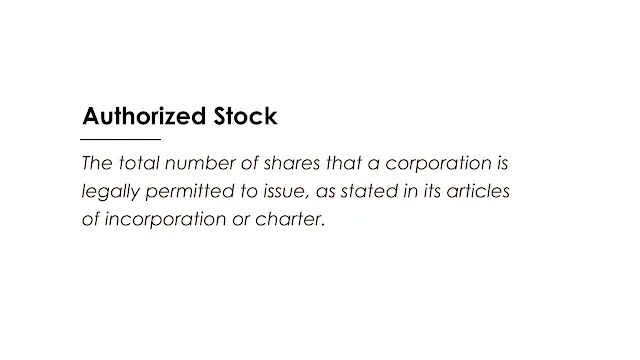 |
| Image: Moneybestpal.com |
Authorized stock, often referred to as authorized shares or authorized capital stock, is the total number of shares that a corporation is legally permitted to issue, as stated in its articles of incorporation or charter.
The number of shares that are actually issued to the public, also known as outstanding shares, is often lower than the number of shares that are authorized.
The balance between the authorized and outstanding shares is what the firm keeps in its treasury and can be utilized for a variety of things, such as giving stock options to staff members, generating money through secondary offerings, or thwarting hostile takeovers.
Definition of Authorized Stock
The quantity of shares that a corporation is legally permitted to issue is known as its authorized stock. The authorized share capital is calculated as the sum of the authorized share number and the authorized share face value. A company's authorized share capital, for instance, would be $10 million if it had 10 million shares with a $1 face value.
The capacity of the management to issue new shares without the permission of the shareholders is restricted by authorized stock. The management would have the unlimited power to issue additional shares in the absence of authorized stock, which could alter the balance of control and profit distribution among shareholders. For instance, current shareholders' ownership and earnings per share would be diluted if management issued new shares at a price below market value.
Changes to the authorized share count must be approved by the shareholders, typically with a majority or supermajority vote. expenditures associated with the process of changing the authorized share capital could include filing fees, stamp duties, legal fees, and shareholder meeting expenditures.
Importance of Unissued Authorized Stock
Most companies do not issue all of their authorized shares at once, but keep some parts of them unissued for different reasons:
Issue of share options and warrants
Many businesses offer their employees the chance to take part in their employee stock option plan (ESOP) or give investors warrants as a perk for purchasing bonds or preferred shares. The corporation needs to have a sufficient amount of the authorized stock unissued in order to issue these shares, which become a part of the outstanding shares upon the execution of the option or warrant by the holders.
Need to raise capital at short notice
When a company needs funds, issuing new shares is typically the last option because it could affect the ownership and earnings per share of current shareholders.
A corporation might, however, issue more shares quickly in extraordinary situations, such as when confronting a liquidity crisis or grabbing a growth opportunity. It is advantageous to have unissued approved stock because it allows management to issue new shares without first seeking shareholder approval to increase authorized stock.
Prevent hostile takeovers
As a safeguard against hostile takeovers, a corporation may choose to hold onto some authorized but unissued stock. The management can issue new shares to allies or to itself (a practice known as a "poison pill") in order to raise the number of outstanding shares and make a takeover more expensive and challenging if a prospective buyer attempts to purchase a sizeable position in the firm.
Examples of Authorized Stock
Let’s look at some examples of how authorized stock works in practice:- Apple Inc.'s 2020 annual report states that the company has 12.6 billion authorized shares. It had 4.3 billion outstanding shares as of September 26, 2020, and 0.8 billion treasury shares (shares that the business buys back). This indicates that Apple has 7.5 billion authorized but unissued shares that it may utilize for a variety of future uses.
- Tesla Inc.'s 2020 annual report states that there are 2 billion authorized shares. It had 0 treasury shares and 1 billion outstanding shares as of December 31, 2020. This indicates that Tesla has 1 billion authorized but unissued shares that it may utilize for a variety of future uses.
- According to its 2020 annual report, Facebook Inc. has 5 billion approved Class A ordinary shares and 4 billion authorized Class B common shares, which have 10 times the voting power of Class A. There were 2.4 billion outstanding Class A common shares and 0 treasury Class A common shares as of December 31, 2020, and there were 0.6 billion outstanding Class B common shares and 0 treasury Class B common shares. As a result, Facebook owns 3.4 billion approved Class B common shares and 2.6 billion authorized Class A common shares that it can use for a variety of future uses.
